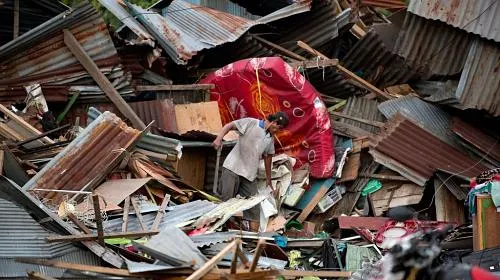CARE will target some of the most remote and in-need communities affected by the earthquake and tsunami
JAKARTA (October 5, 2018) — CARE has begun procurement of key relief items including shelter and sanitation kits with the aim of reaching some of the most remote and, as yet, unassisted communities devastated by last Friday’s earthquake and tsunami.
“We are in the process of purchasing simple, but life-saving items, like blankets, tarpaulins, water buckets and water purification kits. We will source them locally on the island from our base in Makassar. And we are also looking at creative ways we can bring items by boat to neighboring islands like Kalimantan, and from there, onwards by plane to Palu,” said Wahyu Widayanto, CARE Indonesia’s emergency response coordinator on the ground in Palu.
CARE emergency response team members are now on the ground in Palu and nearby Donggala and are working with a local partner organization and other national and international NGOs to assess and determine the most pressing needs of those affected.
According to Widayanto the conditions for people living in the tsunami’s aftermath are grim, despite the good efforts by the Indonesian government: “There are currently only 2 banks that have re-opened and just some small food stores which aren’t sufficient for the community here. Gasoline is limited and drinking water is a problem and a real basic need.”
Widayanto adds: “We aim to reach some of communities located further from the busy hub of Palu city itself who have received no assistance to date. These are people living in more remote and difficult to reach areas of Donggala region who are least likely to receive needed assistance, but are some of those in most desperate need of assistance.”
CARE plans to assist around 100,000 people – mainly in Donggala district – with life-saving water, sanitation, shelter and livelihood support. To do so, CARE is appealing for $15 million in funding to be used over a four-year period.
In addition to the main core relief items, CARE will also provide ‘dignity’ kits to women and girls affected by the disaster which include items such as sarongs and sanitary materials.
“We saw in our emergency response work in Lombok earlier this year that women are usually the hardest hit by a disaster,” Widayanto said. “They tend to be the guardians of family health, and caretakers of children and other dependent family members. They often see an increase in their workload after a disaster of this scale, as well as being increasingly vulnerable to sexual and gender-based violence and exploitation. We are working to ensure their voices are heard and listened to in this emergency response.”
About CARE:
Founded in 1945, CARE is a leading humanitarian organization fighting global poverty. CARE has more than seven decades of experience helping people prepare for disasters, providing lifesaving assistance when a crisis hits, and helping communities recover after the emergency has passed. CARE places special focus on women and children who are often disproportionately affected by disasters. Last year, CARE worked in 94 countries to reach 80 million people, including more than 11 million through emergency response and humanitarian aid.
To learn more, visit www.care.org
Media Contact:
Nicole Harris, 404-735-0871 nharris@care.org

